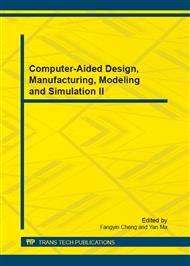[1]
Dai, L., Singular Control Systems, Berlin: Springer-Verlag, (1989).
Google Scholar
[2]
Xu, S., Lam, L., Robust Control and Filtering of Singular Systems, Berlin: Springer-Verlag, (2006).
Google Scholar
[3]
Ren, J., Zhang Q., Positive real control for descriptor systems with uncertainties in the derivative matrix via a proportional plus derivative feedback. International Journal of Systems Science, Vol. 42, no. 1, 2011, pp.1-11.
DOI: 10.1080/00207721.2011.602481
Google Scholar
[4]
Xu, S., Yang C., An algebraic approach to the robust stability analysis and robust stabilization of uncertain singular systems. International Journal of Systems Science, Vol. 31, no. 1, 2000 pp.55-61.
DOI: 10.1080/002077200291451
Google Scholar
[5]
Hill D., Moylan P., The stability of nonlinear dissipative systems. IEEE Trans on Automatic Control. Vol. 21, No. 5, 1976, pp.708-711.
DOI: 10.1109/tac.1976.1101352
Google Scholar
[6]
Willems J., Dissipative dynamical systems: Part 1. General theory, Archive for Rational Mechanics and Analysis, vol. 45, no. 5, 1972, pp.321-351.
DOI: 10.1007/bf00276493
Google Scholar
[7]
Dong, X., Robust strictly dissipative control for discrete singular systems, IET Control Theory and Applications, Vol. 1 no. 4, 2007, pp.1060-1067.
DOI: 10.1049/iet-cta:20060173
Google Scholar
[8]
Yang L., Zhang Q., Robust impulse dissipative control of singular systems with uncertainties. Acta Automatica Sinica, vol33, no. 5, 2007, pp.554-556.
DOI: 10.1360/aas-007-0554
Google Scholar
[9]
Su X., Robust dissipative control for time-delay bilinear singular systems with uncertainties, Control and Decision, vol. 27, no. 4, 2012, pp.623-626.
Google Scholar
[10]
Nataša A, K., Dissipativity theory for singular systems. Part I: Continuous-time case, Proceedings of the 44th IEEE Conference on Decision and Control, vol. 2005, 2005, pp.4090-4095.
DOI: 10.1109/cdc.2005.1583061
Google Scholar
[11]
Feng Z., Lam, L. and Gao H., α-Dissipativity analysis of singular time-delay systems, Automatica, vol. 47, no. 11, 2011, pp.2548-2552.
DOI: 10.1016/j.automatica.2011.06.025
Google Scholar
[12]
Wu Z., Park J., and Su H., Dissipativity analysis for singular systems with time-varying delays, Applied Mathematics and Computation, vol. 218, no. 8, 2011, pp.4605-4613.
DOI: 10.1016/j.amc.2011.10.044
Google Scholar


